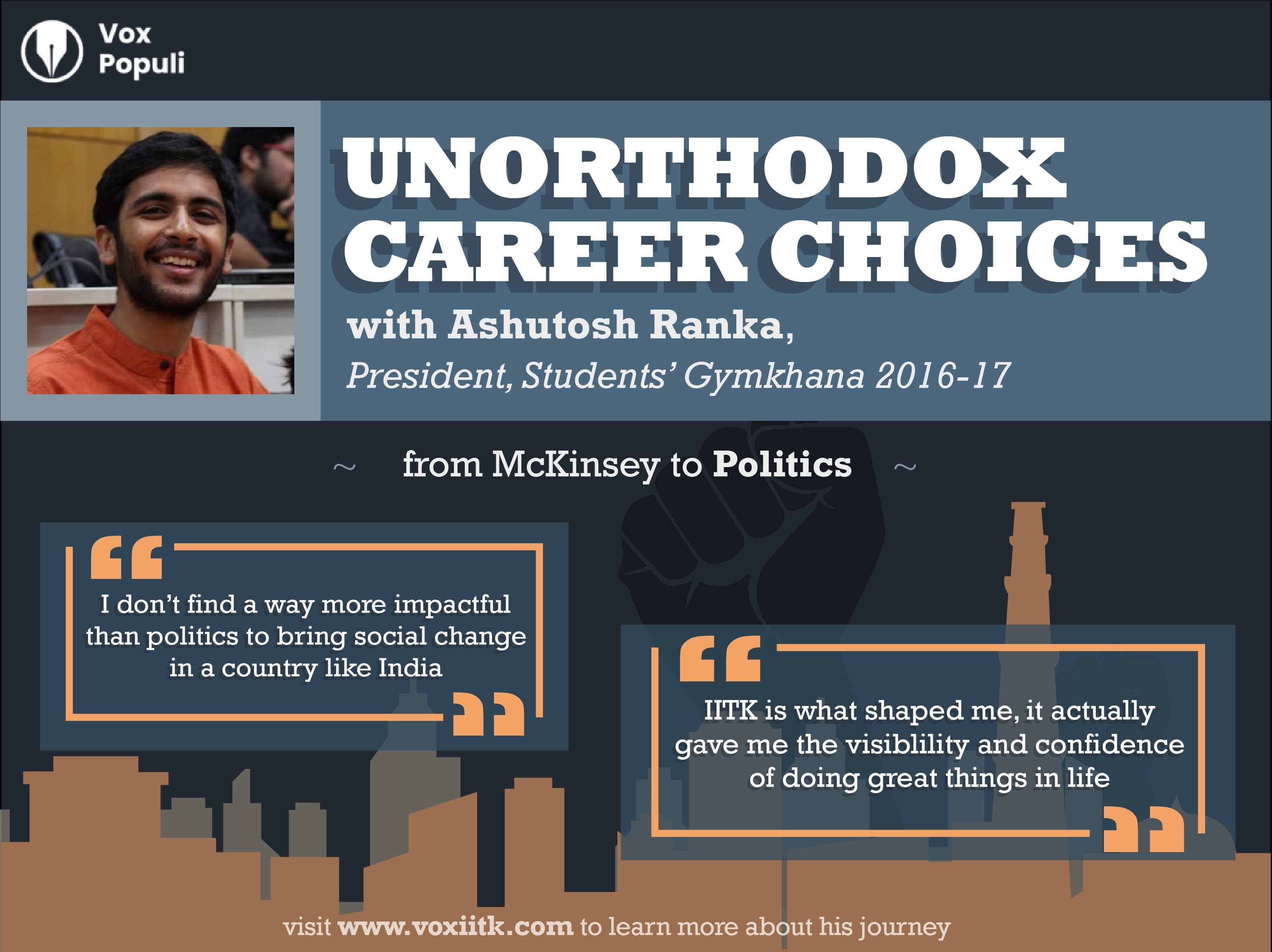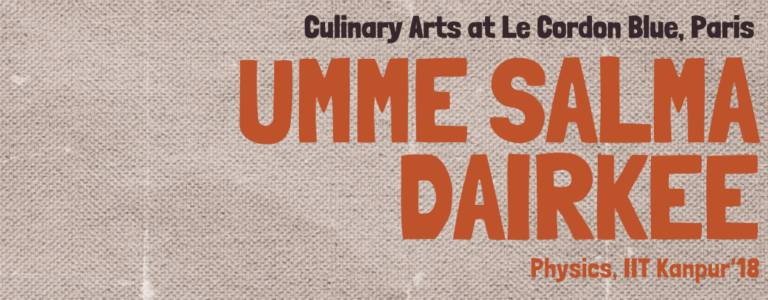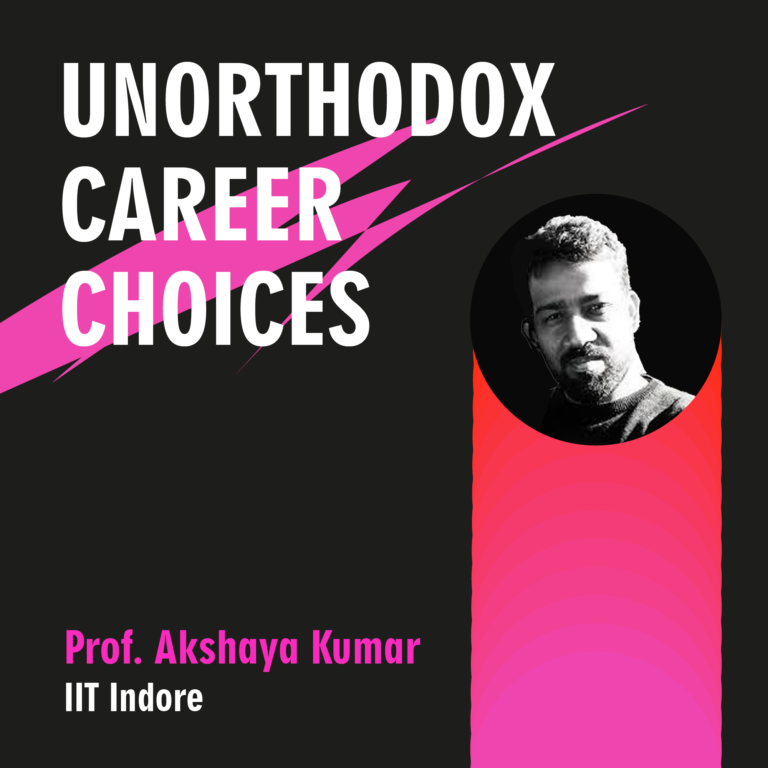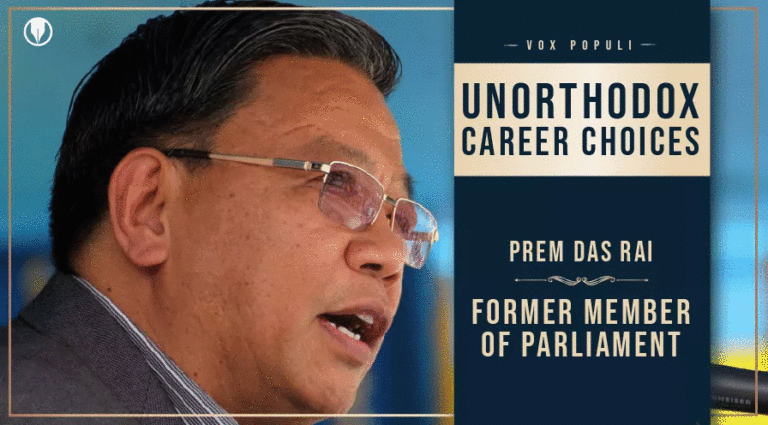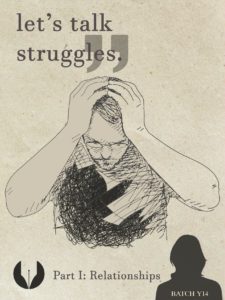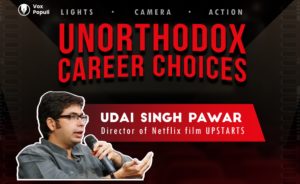Vox Populi brings you the third edition of the series Unorthodox Career Choices. We interview people who have taken the leap of faith and bring their stories to you. This edition brings you the story of Ashutosh Ranka, an alumnus of the UG Y13 batch. After serving as the President, Students’ Gymkhana 2016-17, he joined McKinsey. After 1.5 years, he joined Aam Aadmi Party as a full-time politician. Check out some excerpts from our conversation with Ashutosh.
Tell us about your story. How did you join politics and what motivated you towards joining politics?
While I have been motivated to work for the country since my school days, it is difficult to relate the decision of joining politics to a single incident or story. An experience that I distinctly remember is watching Rang de Basanti in 2005- the movie struck a chord with me! I realized that there is a lot of mess in the country and to sort out the mess, I need to be a part of that mess. That is when I decided I wanted to work for the country, but that I wanted to join politics was decided after my tenure as the President, Student Gymkhana at IITK.
As the president, I realized that being in power gives us the opportunity to work for the community. So, although I joined Mckinsey after graduation, I knew I wanted to join politics.
It so happened that about 1.5 years into the job, I looked around to find all my close friends pursuing their passions- three were pursuing UPSC preparation, one had opened his startup and one had left her job for higher studies. That is when I thought if my friends are doing what they wanted to do, then why don’t I pursue my dreams as well? That is when I quit my job and joined Aam Aadmi Party full time.
With a high paying job and a promising career ahead, how did you cross the mental threshold of giving it all up? And how did your family and friends react?
No doubt, my job at Mckinsey was very lucrative and promising. I could’ve any-day applied to a top B school. So, definitely, it was a huge mental barrier, to give it all up. But then I ultimately realized that it was just a ‘mental’ barrier. While I had a good job, I knew that I did not want to do consultancy. And I believe that you can only excel in something you really want to do. So, overcoming the mental barrier was a lot about coming to peace with myself. Once that happened, it mattered less to me what others said about the choice I made.
Coming to my family, honestly, they were shit scared (laughs) as every Indian middle-class family would be. But then I talked to my parents and asked them to allow me just a year to experiment. If it works out, there’ll be no one happier than you (his parents). If it doesn’t, I’ll get back to my corporate life. They agreed and that’s how I quit my job and joined politics.
Shifting from a McKinsey job to a political volunteer, what were the changes in your lifestyle?
There were broadly three differences.
Firstly, life in McKinsey was very structured- I had 9-5 working hours, no-work weekends. While in political life, there is no structure. There are no weekends as well. When we have elections, I work 17-18 hours for all 7 days. Other days are relaxed generally.
Secondly, political work is very ad-hoc. In my 1.5 years at Mckinsey, I worked in 3 different industries, on different projects, but I was essentially doing the same thing- solving problems, one at a time. On the other hand in politics, work varies week to week, ranging from election campaigns, social media to say, working on the corona crisis or a primary service.
Thirdly, unlike corporate life, politics lacks a strict hierarchy.
Honestly, most of these lifestyle changes do not matter if you enjoy your own profession. During my Presidential tenure, I had a similar lifestyle- har roz kuch na kuch hota tha and I used to love that life. So my political life is essentially college life rehappening for me, at a larger scale.
Do you get paid by the party to work as a political volunteer? How do you earn your livelihood?
AAP is a more or less public-funded party and so expecting to make a living out of AAP would be stupid. However, I have heard that the case is different for other national parties with huge corporate fundings.
That said, I did manage to get a pay, last year, only because it was election season and it is during elections that parties spend most of their money. Once the election is over, it is a different scenario and you need to make arrangements to earn a livelihood. Honestly, for people like us coming from IITs, it is not difficult to make other arrangements like a part-time job. It just requires more effort. For example, I am currently working for the Delhi Assembly Research Fellowship.
For me, I had enough savings from my Mckinsey stint to survive for the next couple of years. But, if I take a much more general view, then a newcomer who is planning to step into politics for like forever, needs to figure out beforehand, how he’ll earn his livelihood.
Tell us about your work as a political volunteer so far. What are you working on now?
I joined AAP around the Lok Sabha elections in March 2019. Then, I was managing the campaign of Atishi Marlena, in one of the assembly constituencies in her Lok Sabha constituency of East Delhi. After the Lok Sabha elections, came a lull period followed by the preparations for Assembly Elections, which was a do or die election for the party. This time around I was managing WhatsApp outreach for AAP and was also the election observer for Manish Sisodia. An election observer basically oversees all campaign-related activity in a particular constituency. Two months right before the state elections, I became the campaign manager for a candidate, managing all the aspects of the campaign in the constituency, be it logistics or teams.
After the elections, I started working on governance and right now I am involved in making the action plan for countering the pollution in Delhi.
What are your aims/goals for the future?
Politics is a very long race. You don’t succeed in 1-2 years- You might but that’s not how I want to take it. If we look at all the successful leaders around us say Arvind Kejriwal or Modi, they all have a very long journey behind them. Arvind worked for 10-12 years in Delhi slums; Modi has been in politics since, 40-45 years. This is why these leaders know the ground very well, they know how people think, what people want.
If I work for the party, I might get a ticket in the next 4-5 years, if not Delhi, then at least in some other state. But that’s not how I want to approach it. I want to live this journey of mine and understand the ground before I contest for office. I am planning to contest for office about 10 years from now.
How do you compare politics as a means of social change with other ways, namely NGOs and civil services?
I have a very strong opinion on this- it might not be the right one. I don’t find a way more impactful than politics to bring social change in a country like India.
Suppose, there’s an NGO that wants to imbibe the culture of entrepreneurship in school students. The NGO will start with few schools; establish credibility; then expand to more schools; gain government trust and then scale up to 500-600 schools. It will take an NGO about 20-30 years to make the kind of impact the Delhi government was able to make in 2 months by including entrepreneurship curriculum in schools. Today, 7.5 lakh students take entrepreneurship classes.
Talking about bureaucracy, in my last Mckinsey project, I was working with the UP health ministry and interacted with some senior secretaries in the UP government. I realized despite all of the secretaries being in very high positions and having a lot of power, they do not call the shots. They have to work on the instructions of the ministers. This is the only reason I did not pursue civil services, and chose politics instead.
Considering that you have led AAP’s WhatsApp Outreach team, what are your thoughts on the fake news and communally loaded messages floated by political parties during elections?
To be honest, WhatsApp during elections is very dirty, dirtier than one can imagine! And I am really worried about this. Of all the social media platforms, WhatsApp is the worst, because WhatsApp doesn’t have a face. When you post something on Facebook or Instagram, it has a face, I see that some random guy posted it. On WhatsApp, you can simply forward with no accountability, that’s what makes it very dangerous. So it’s grossly misused as a propaganda machine.
The country is much more polarised than ever before, thanks to WhatsApp. Political leaders don’t speak every day, but Whatsapp goes on 365 days a year, and it’s been going on since the last 4-5 years, vigorously fueling the spread of fake news. This is extremely worrying and dangerous There’s a lot that needs to be done to curb this, but currently, no measure is being taken to control the same.
Tell us about your stay at IIT-K and your experience as the President, Students’ Gymkhana, and how did it change your overall personality?
I have always acknowledged that IITK is what shaped me, it actually gave me the visibility and the confidence of doing great things in life. As the President, I worked on various issues: some radical ones like drugs and substance abuse, others which would really help Gymkhana in the long term, like external sponsorship for Gymkhana and student entrepreneurship. That’s when I realized that being in power gives you an opportunity to work for the community.
I think, all the unorthodox career choices made by IITK students over time are greatly influenced by the 4 years they spent here, thanks to the breadth of opportunities that IITK provides.
What are the differences that you see in IITK now and IITK then?
I have strong opinions on this. The fact that 1st-year students are denied the opportunity to live with their seniors is very concerning and disheartening. I owe a lot to my seniors for their guidance with my placements, internships, and academics, as well as I had some of my best experiences on the campus due to interaction with seniors.
Also, the rigour and passion to win Galaxy pushed me to my limits. Galaxy ke wo 4 din mere liye utne hi intense hote the jitne aaj Election ke hote hain. That level of inter hall rivalry is missing these days. So, I am emotionally attached to the culture that shaped me and I’d like it to thrive.
Having said that, I also acknowledge that cultures are meant to evolve and there is nothing right or wrong about it. Like every change, it has negative and positive effects. For example, unlike now, we despised speaking in English and I don’t even know why (laughs).
How do you compare national politics and the politics in IITK, or in general in IITs?
Politics at IITK has broadly two aspects. The first one is the inter hall politics and the second is PG politics, which slightly resembles national politics as it has a religious and social angle to it.
90% of pre-election campaigning in IITK is free from religious, caste, and community bias. This is starkly different from national politics. Post-election governance in IITK is more professional as compared to national politics as all IITK junta is very action-oriented.
Additionally, the IITK community is very ignorant towards Gymkhana, IITK politics, or national politics. We have a low voter turnout (35-40% in my time), but on the other hand, national politics has a greater turnout, ranging around 60-70%. People at IITK are agnostic of Gymkhana- partially because of Gymkhana’s inability to convey its importance and partially because people are chilled out and don’t care about student affairs as much.
Talking about other IITs, the caste and religious perspectives become significant in IIT Madras while IIT KGP has open debates, resulting in more intense elections and politics.
Lastly, what message would you like to give to the student community?
There are two broad messages I want to give- Get involved in national affairs and Step out of the rat race.
On the first suggestion, it is important to have informed opinions on national issues, since it is people like you and me who will hold influential positions and will have a say in national matters. Currently, many alumni have the power to drive the agenda but they don’t, because of ignorance and lack of opinions since college days. Although, during my tenure as President, I also believed that IITK should be kept away from national politics as I didn’t want organizations like ABVP/NSUI/CYSS to get involved in IITK politics. But now, I believe I was partially wrong because due to this, IITK students either lack a political opinion or have a very uninformed one.
For the second suggestion, I want you to remember the dialogue from 3 Idiots where Rancho talks about the ‘rat race’ and all of us had a hearty laugh then. But 1.5 years into McKinsey, I realized that I was actually a part of that rat race. I realized that I was in McKinsey not because I wanted to do consulting, but because everyone on campus said that it is the best thing to do after IIT. Engineering from IIT, a job in a consulting company, MBA from an IIM, or Stanford are like goal-posts set by the society and most of us are racing to achieve these goal posts and have no idea what they are doing and why they are doing it.
My suggestion, especially to the graduating batch and recent alumni, is that please reflect on what you really want to do in life. I am not asking you to not do consulting or not do an MBA. If you have a nag for managerial work, do it!
All that I am asking you to do is make informed decisions because you would not want to be a 40 year old realizing one day as to how much more fulfilling life could have been- just if you had followed your passion!
Credits: Abhimanyu Sethia, Aditi Bajpai, Ananya Gupta, Devansh Parmar, Raj Varshith Moora, Sarvesh Bajaj, Varun Soni




